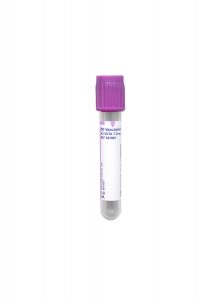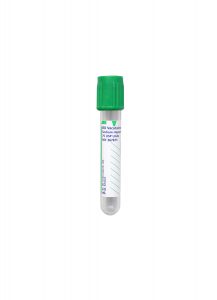Technical Brief
Chromosomal Single Nucleotide Polymorphism (SNP) Microarray for Hematology on Bone Marrow
Test Name
Bone Marrow Cancer Chromosome Microarray + SNP (BMHSNP)
CPT Code
81406
Methodology
Genomic microarray
Turnaround Time
14 days
Specimen Requirements
Type:
Bone marrow
Volume:
4 mL
Specimen Container:
Lavender BD Hemogard™ K2EDTA Tube
Transport Temperature:
Ambient

Type:
Bone marrow
Volume:
4 mL
Specimen Container:
Green BD Hemogard™ Sodium Heparin Tube
Transport Temperature:
Ambient
Specimen Collection & Transport
Pathology Consultation Kits
For hassle-free specimen shipping, our laboratories can provide clients with Bone Marrow Biopsy Pathology Consultation Kits.
Each kit includes the following:
– (1) White CCL box (6.5 x 6 x 2.75 inches)
– (2) Slide holders
– (2) 10% neutral buffered formalin
– (2) Lavender K2EDTA tubes
– (2) Green Sodium Heparin tubes
– (1) Foam insert
– (1) Specimen bag
– (1) Absorbent sheet
– Shipping Label and Bag
Stability
Ambient:
48 hours
Refrigerated:
Unacceptable
Frozen:
Unacceptable
Additional Information
Background Information
Chromosomal microarrays are applied for the detection of genomic and allelic imbalances in hematological malignancies and solid tumors. Chromosomal microarray (CMA) and single-nucleotide polymorphism array (SNP-A) provide a combination of karyotyping and FISH with whole-genome scan and a targeted approach at a higher resolution.
Cleveland Clinic Laboratories uses a cancer-specific microarray designed by the Cancer Cytogenomics Microarray Consortium (CCMC) that targets genomic regions associated with cancer. This array can be used for diagnostic testing of hematological malignancies. Common indications include, but are not limited to, acute and chronic leukemia, myelodysplastic syndrome (MDS), and myeloproliferative disease.
This array has the ability to detect genome-wide copy number variants (CNV) with simultaneous detection of loss of heterozygosity (LOH), also known as copy neutral LOH (cnLOH). The array contains approximately 20,000 cancer-associated 60-mer CGH probes covering more than 500 cancer-related genes (1 probe per 0.5-1kb) in addition to 60,000 single nucleotide polymorphism (SNP) probes and backbone probes evenly distributed across the genome. This analysis can interrogate the whole genome for recurrent and novel clinically-relevant copy number variation (CNV) at an increased resolution over FISH or chromosome analysis.
Chromosomal microarray aids in diagnosis, prognosis, and therapeutic management by identifying gains, losses, or LOH in hematological disorders. It is also helpful in monitoring disease progression. Chromosome analysis or karyotyping for detection of genetic abnormalities is hindered by suboptimal cell growth or chromosome morphology, and clonal or subtle unbalanced chromosomal abnormalities may be missed. FISH provides an improved rate of detection of clonal abnormalities when compared to karyotyping, but only for the targeted region.
Chromosome or FISH testing cannot detect copy-neutral events that are associated with hematological disorders, which are often due to mutations and subsequent selection of mutant tumor-suppressor genes or oncogenes. However, SNP microarray detects submicroscopic chromosomal variants involving gains or losses in chromosomes across the genome in addition to LOH.
Clinical Indications
This array can be used for diagnostic testing of hematological malignancies for myeloid and lymphoid disease. Common indications include, but are not limited to, acute and chronic leukemia, myelodysplastic syndrome (MDS), and myeloproliferative disorders. The assay can assess prognosis and monitor disease progression and response to therapy (loss/gain of genomic DNA; loss of heterozygosity (LOH)).
Methodology
Designed by the Cancer Cytogenomics Microarray Consortium (CCMC), the Agilent SurePrint G3 Cancer CGH + SNP 4x180K Microarray Kit is a cancer-specific microarray designed to target genomic regions associated with cancer. This array has the ability to detect genome-wide copy number variants (CNV) while simultaneously detecting LOH.
The array contains 20,000 cancer-associated 60-mer CGH probes covering more than 500 cancer-related genes (1 probe per 0.5-1Kb) in addition to 60,000 single nucleotide polymorphism (SNP) probes and backbone probes evenly distributed across the genome.
Interpretation
A written summary and interpretation of the microarray findings are provided in the Test Overview:
1. Normal.
2. Pathogenic.
3. Unclear clinical significance, likely pathogenic.
4. Unclear clinical significance, not otherwise specified.
5. Unclear clinical significance, likely benign.
Limitations
Microarray analysis cannot detect balanced rearrangements like translocations, inversions, and insertions that may be important for diagnosis and prognosis of hematological disorders.
In addition:
• Low-level mosaicism may not be detected.
• May not be appropriate for individuals with expected lower levels of malignant cells.
• Not recommended for minimal residual disease
The assay does not detect:
• Balanced chromosomal rearrangements.
• Base pair mutations and small deletions/duplications.
• Positional information for chromosome rearrangements.
• Low-level mosaicism (small clones).
Therefore, microarray findings should be interpreted together with other concurrent test results, such as flow cytometry, morphology, FISH, chromosome analysis, and other studies
as appropriate.
The chromosomal SNP Array for hematology may or may not detect low-level mosaicism; therefore, this test is not recommended for detecting minimal residual disease.



